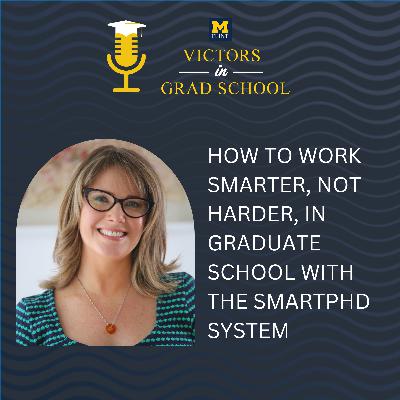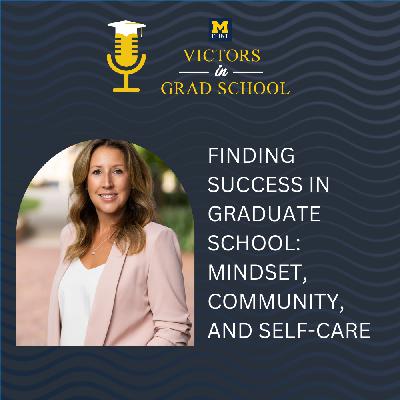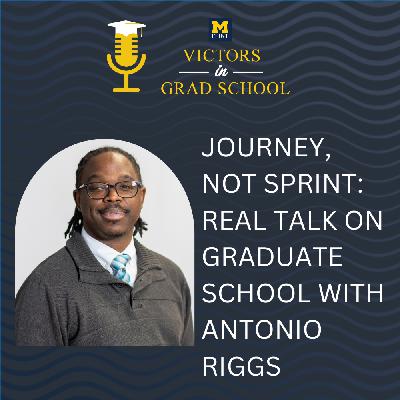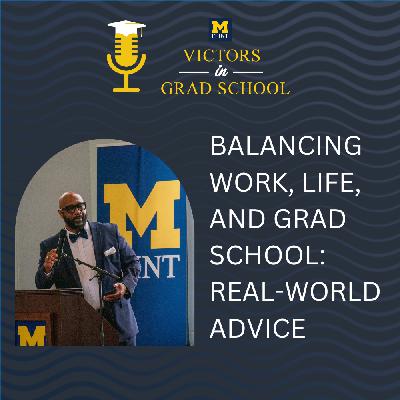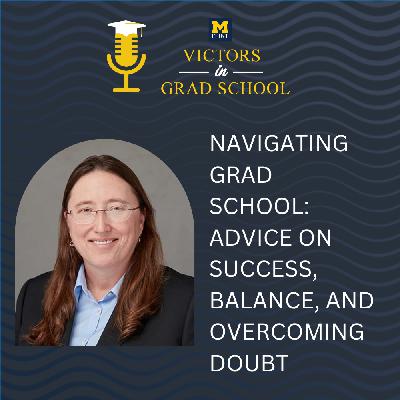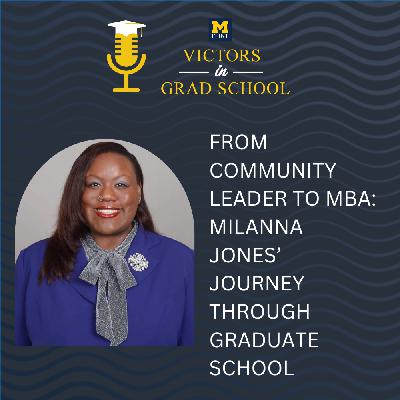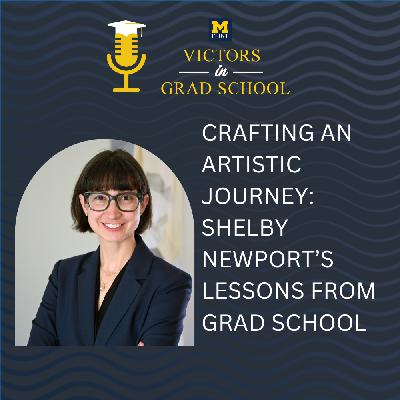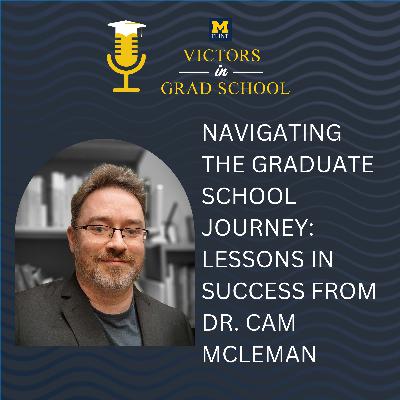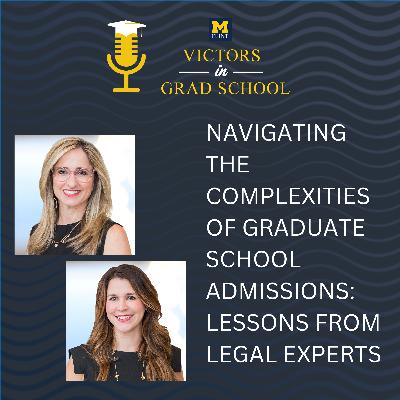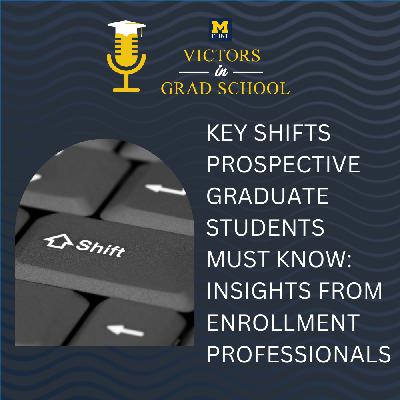Why Mentorship Matters in Grad School: Insights from Dr. Jonathan Bartels
Description
Embarking on graduate school is more than just an academic decision—it’s a deeply personal journey marked by self-discovery, challenge, growth, and, ultimately, transformation. In the recent episode of Victors in Grad School, Dr. Christopher Lewis sat down with Dr. Jonathan Bartels, Assistant Professor of Education at the University of Michigan-Flint, to explore the realities of pursuing advanced degrees and the invaluable lessons learned along the way.
Dr. Bartels’ candid reflection on his path—from an undergraduate at East Carolina University to earning his master’s while teaching, and then pursuing a doctorate at UNC Chapel Hill—sheds light on several key themes that resonate with anyone considering or currently navigating graduate education.
1. The Nonlinear Nature of Academic Paths
One of the central takeaways is that the journey to and through graduate school isn’t always mapped out from the start. Dr. Bartels never planned to pursue a master’s or a doctorate—he was fueled by a desire for deeper intellectual engagement and the encouragement of mentors who saw potential in him. His story reassures listeners that it’s okay—and often beneficial—to let curiosity and passion guide your next steps, even if they diverge from your original plan.
2. The Power of Mentorship and Community
Dr. Bartels emphasizes how pivotal faculty relationships were to his development, especially choosing graduate programs based on the research interests and support of specific professors. Connecting with advisors and building a supportive cohort community can ease transitions and provide both professional opportunities and emotional sustenance.
3. Managing Mindset and Embracing Growth
Imposter syndrome and self-doubt are common companions in graduate school. Dr. Bartels opens up about normalizing these feelings and maintaining perspective: your presence in a program is evidence of your worth, and challenging moments are natural signs of growth. Reframing experiences from “jumping hoops” to opportunities for learning and self-betterment is key for long-term success.
4. Balancing Life and Prioritizing Well-Being
Graduate study often means juggling academics, work, family, and personal commitments. Dr. Bartels offers practical advice—set boundaries, proactively communicate with faculty, make time for rest, and remember that self-care is not a luxury but a necessity for sustainable, effective learning.
5. Purpose-Driven Learning
Most crucially, Dr. Bartels reminds us to continually revisit our “why” for pursuing graduate education. Anchoring your studies in your personal and professional aspirations provides resilience, motivation, and a sense of direction to weather the inevitable challenges.
Whether you’re contemplating graduate school or already in the trenches, this podcast episode is packed with honest advice and encouragement. Listen in to gain insight and inspiration for your own academic journey!
TRANSCRIPT
Dr. Jonathan Bartels [00:00:01 ]:
Welcome to Victors in Grad School, where we have conversations with students, alumni, and.
Dr. Christopher Lewis [00:00:06 ]:
Experts about what it takes to find.
Dr. Jonathan Bartels [00:00:08 ]:
Success in graduate school.
Dr. Christopher Lewis [00:00:11 ]:
Welcome back to Victors in Grad School. I'm your host, Dr. Christopher Lewis, Director of Graduate programs at the University of Michigan, Flint. Really excited to have you back again this week. As always, every week we are working together on this journey that you're on. And I call it a journey because it truly is. As you go from your undergraduate degree to looking at the possibility of a graduate degree, or maybe you've already applied, you got an accepted, or maybe you're even in a graduate program now. This continuum that you're on is definitely a journey.
Dr. Christopher Lewis [00:00:42 ]:
You're going to learn a ton along this whole pathway. But there are things that you can do right now to prepare yourself better for the future that you want to attain. And that's what this show is all about. This show is all about helping you to. To identify ways in which you can be successful in this graduate journey that you're on. And that's why every week I love being able to bring you different people with different experiences that can help you in many ways to learn things that they may not have known along the way that they had to learn the hard way, and maybe gain some additional insight that can help you as you go through your own journey. This week we got another great guest with us. Dr.
Dr. Christopher Lewis [00:01:24 ]:
Jonathan Bartles is with us. And Dr. Bartles is an assistant professor of education at the University of Michigan, Flint, and he has his own educational journey that he went on to get his doctorate and now be teaching at the University of Michigan, Flint. I'm really excited to be able to have him here today and to have him share some of his own experiences. Jonathan, thanks so much for being here today.
Dr. Jonathan Bartels [00:01:46 ]:
Thanks so much for having me.
Dr. Christopher Lewis [00:01:47 ]:
It is my pleasure, really excited to have you here today to be able to talk about this journey that you went on. And I, as I said, it is a journey. And I know you did your undergraduate work at East Carolina University. You stayed on for a master's degree there and then went on to get a doctorate. Every person comes to thinking about graduate school in a little bit different way. And I guess for you, I would love to take you back to that point, take you back to those days at East Carolina University where you were getting that Bachelor of Science degree in English Language Arts and Teacher education. And at some point you made a decision. You made a decision that you were going to continue on into a graduate career degree, and you made that Choice.
Dr. Christopher Lewis [00:02:32 ]:
So talk to me about that. What made you choose that graduate education was the next step and that you were going to continue on?
Dr. Jonathan Bartels [00:02:39 ]:
Yeah, absolutely. So it actually wasn't part of my plan. I graduated with my undergraduate and I started teaching. And my plan was to. I'm going to go teach and I'm going to enjoy it. And I loved teaching. The first year of teaching is. We often refer to it as kind of treading water.
Dr. Jonathan Bartels [00:02:51 ]:
It's. You're trying to, you know, just figure everything out in your own classroom. So I was doing that and that was really fulfilling and time consuming. But at the end of that first year, I realized that there's a level of intellectual engagement that happens at a university campus that doesn't happen at like a high school campus. It's not to say I didn't have brilliant colleagues and phenomenal students who were pushing me intellectually, but there was a piece that I felt like that I realized I was missing from being on the university campus. And so I thought about it and kind of looked around and decided to stick with East Carolina University to go back and work on my master's while I was continuing to teach, to get back into some of those academic conversations. And I was coming to get involved with different research projects and things like that. And so it was just a way for me to keep that type of thing going.
Dr. Jonathan Bartels [00:03:35 ]:
And that was really my drive to. That sent me back to grad school.
Dr. Christopher Lewis [00:03:39 ]:
Well, you just mentioned that you stayed on at East Carolina University and getting a Master of Arts in Education in English. And I guess one of the questions that I have is taking you back to when you made that decision that you were going to continue on. There are a lot of different Master of Arts programs that are out there, lots of different English programs that are out there. You chose to go back to your undergraduate institution to be able to get that degree. Talk to me about that decision making process for yourself. Maybe what you were looking for in a degree and what made you ultimately choose to stay at the same university for your master's.
Dr. Jonathan Bartels [00:04:16 ]:
There are a ton of options. And within North Carolina, there are phenomenal schools and colleges of education that I could have selected from and still been on that wonderful in state tuition that they had there at that time. I decided to stay with East Carolina because of the faculty. There was one particular faculty within English education that I had already kind of been doing a little bit of work with. And it was somebody that we had a lot of similar interests and connections. And so for me, that was my driving force. For staying with ECU was. His name's Dr.
Dr. Jonathan Bartels [00:04:44 ]:
Todd Finley. Really interesting work that he does with different types of emotional awareness and technology and looking how technology is influencing ed. And I wanted to continue my work with him. And so really it was about really the faculty and the faculty's research interests that kind of made me want to stay there.
Dr. Christopher Lewis [00:05:00 ]:
Now you stayed at East Carolina, got your degree, and at some point during that point in time, you made a big shift in deciding to completely move o



